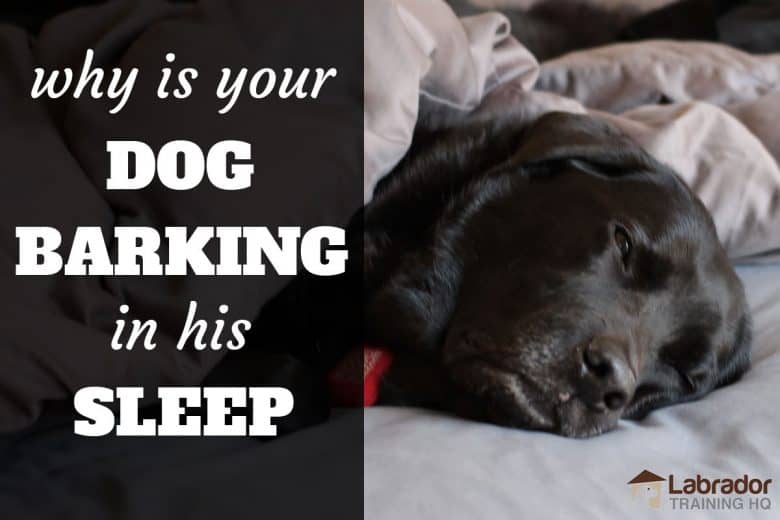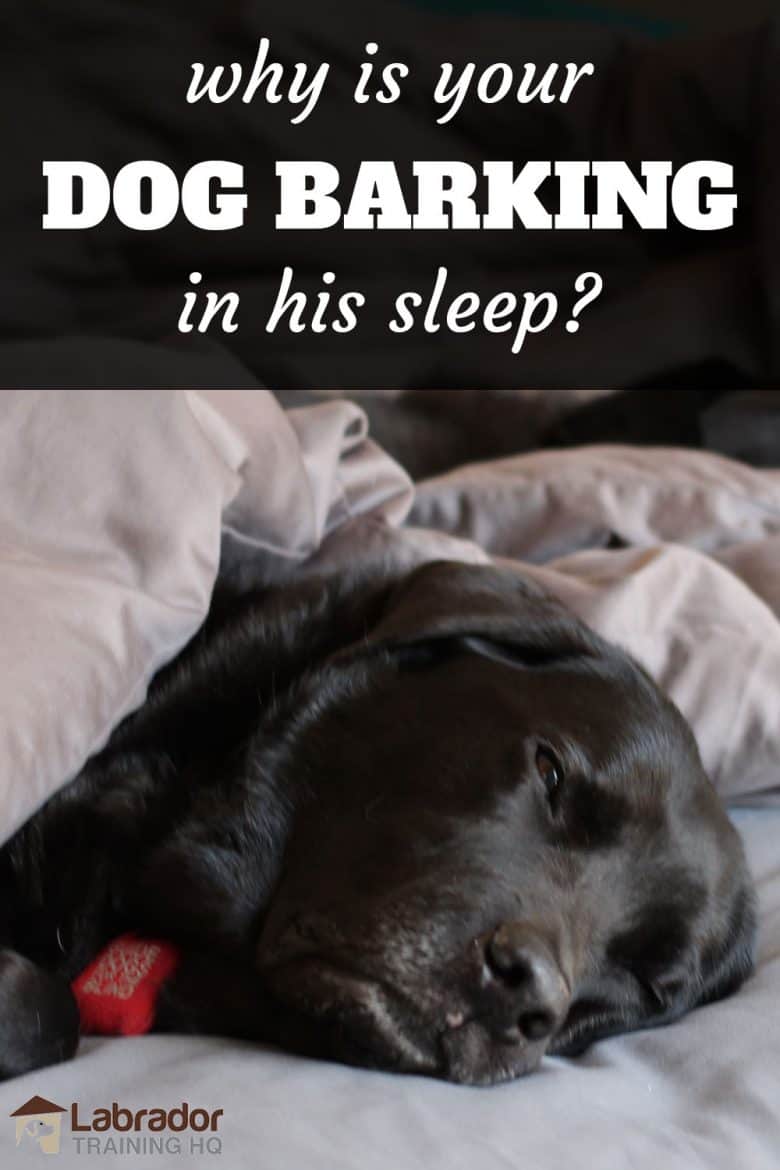This post may contain affiliate links. We may earn money or products from the companies mentioned in this post.

You wake in the middle of the night to the sound of your dog barking.
You stick your head out to see what is happening, only to find that you dog is barking and growling in their sleep, again.
This is actually nothing to worry about, and it is completely normal and healthy behavior for dogs; you shouldn’t worry about waking them up.
However, if the noise they are making is starting to have an impact on your sleep, there are a few things that you can do.
We have outlined exactly why dogs bark in their sleep and why you shouldn’t worry about it and just let them do their own thing.
However, not all dog sleep problems are so easily shrugged off. Snoring and insomnia can be signs of more serious medical issues.
Why Is Your Dog Barking In Their Sleep?
When dogs bark in their sleep, it is because they are dreaming. Research into dog brain waves as they sleep show that dog sleep cycles are very similar to human sleep cycles.
Just like humans, when dogs lay down to rest, they usually pass a short period of relaxed wakefulness, that usually lasts around five to ten minutes.
They then enter a light stage of sleep when their heart rate slows and body temperature drops.
Their body is then ready to enter a deeper state of sleep, known as non-REM sleep, when the body begins the work of repairing itself, regrowing tissue, and rebuilding muscle and bone.
But neither humans nor dogs stay in the deep non-REM sleep, but rather cycle between deep non-REM sleep and REM sleep. REM stands for rapid eye movement, and this is when we dream.
The body can’t do its repair work during this phase of sleep as breathing and heart rate quickens, but this is when we, and our pup, dream.
When we dream, we know that we relive things that have happened to us during the day or work through problems that we were unable to solve. Although our dogs can’t tell us, they probably dream about similar things.
Maybe they are dreaming about chasing a cat or reliving a particularly lively game of catch.
They might also be having a nightmare, imagining what would happen if they actually got into a fight with that dog that lives across the street.
When your dog is dreaming, they are using all of their senses; this is why you might see their eyes moving underneath their lids, their ears moving, and their paws twitching.
Their dreams can also induce them to bark, growl, or make other noises, just like they would when they are awake.
I used to love watching Stetson’s tail start wagging when he was in the middle of a dream. I figure it must be a good dream. :)
How much a dog will bark in their sleep depends on the individual dog. Some might not bark at all, while others tend to be quite loud.
As a general rule of thumb, you can expect small dogs to bark a bit more, as they pass between non-REM and REM sleep more quickly, and therefore, have more dreams.
Small dogs pass into REM sleep around every 10 minutes, while larger dogs keep a more human timetable, passing into REM around every 90 minutes.
What Should You Do When Your Dog Barks In Their Sleep?
The short answer to that question is nothing! It is completely normal and natural for dogs to bark in their sleep, and it is not doing them any harm.
If they seem like they are in distress, it may be that they are having a nightmare, but your dog may need to just get through their nightmare, just like you.
Advice from most vets is actually not to wake your dog if they are barking in their sleep. It can be very disorienting for people to be woken when they are in deep non-REM sleep or REM sleep, as it is a big jolt for the brain.
This has probably happened to you, and it can feel you leaving groggy; it can be difficult to return to the sleep state you need to get a good night’s rest for the next day.
The same is true of your dog. They may feel very disoriented if you wake them and may even snap at you depending on what they were dreaming about.
In rare cases, dogs can develop REM Behavior Disorders, where their nightly antics aren’t limited to just a bit of barking and paw twitching.
If things escalate to them chasing inanimate objects around the house only to awake as if nothing had happened, it is time for a trip to the vet.
What If The Noise Is Disturbing Your Sleep?
If your dog’s nightly calls are interfering with the sleep of others in the household, there are things that you can do. However, one of those things should not be to give your dog any kind of medication.
Veterinary prescribed sleeping pills should only be given to your dog in extreme circumstances, and your vet is unlikely to give you a prescription on the basis of night time barking.
Also, you should never give dogs human medicine. While our sleep cycles may be very similar, our physiognomies are very different, and this can cause them serious health issues.
Rather than trying to stop your dog barking, you should see what you can do to minimize the impact of their barking on other members of the household.
You can do things such as place your dog’s bed further away from other sleepers in order to minimize the impact of their noise.
Wait! But What If They Are Snoring?
Barking in their sleep and snoring are two different things, but both of them can cause a lot of noise that can keep the rest of the family up.
Again, dogs tend to snore for the same reasons as humans – some kind of obstruction of the airway.
This could be caused by allergies, respiratory illness, obesity, or just the shape of their snout.
Poor Bulldogs are particularly bad snorers because of the shape of their snout. But if the cause is something else, there are a number of things that you can do.
Also, unlike the case of sleep barking, snoring is an issue that should be addressed.
If it is not just the occasional night of heavy sleep but rather a consistent problem, then they are probably also having problems breathing while they are awake.
Dogs use their breathing and, in particular, rapid breathing to regulate their temperature.
If they are unable to do that, it can have serious health repercussions. In other words, consistent snoring means that it is time for a trip to the vet.
What If My Dog Can’t Sleep?
But if your dog is constantly making a lot of noise at night, it is a good idea to check that they are actually sleeping. They could just be howling for you for attention or to let you know that they are in some kind of distress.
Insomnia is actually pretty rare among dogs and is usually a sign of another issue such as pain, caused by arthritis, or anxiety. Your vet should be able to help you get to the root cause of the insomnia and recommend treatment.
First make sure that the reason that they are not sleeping at night isn’t that they are sleeping too much during the day. While the specifics differ from dog to dog, on average, dogs need between 12 and 14 hours of sleep each day.
That means that there is plenty of space for naps in their daily schedule, but they should not be sleeping the day away.
In terms of general measures that you can take to improve their sleep condition, the first thing to consider is where your dog sleeps.
Just as you can wake up feeling grumpy and groggy if you sleep on a bad mattress, so can your dog.
Beds that don’t protect their joints from impact can increase their pain, worsen their condition, and prevent sleep.
Investing in an orthopedic bed for your dog can be a good first step.
For dogs that seem stressed or anxious, making sure that they are getting enough Omega-3 fatty acids in their diet is a good first step.
You should also up the amount of time you spend with them during the day, both to wear them out for a good night’s sleep and to increase their feelings of security and happiness.
Wrapping Up
It is completely normal for dogs to bark in their sleep as part of the REM dream cycle, and in general, it is not something you should worry about.
Definitely avoid the urge to wake them up, as this can severely interfere with their sleep patterns, leaving them disoriented and over tired.
If their noise is becoming a nuisance, try moving their bed to another part of the home where they won’t disturb anyone.
However, make sure your dog’s sleep barking is just that. If they are snoring every night, or are up barking all night because they are suffering from insomnia, these are signs of more serious medical conditions that should be dealt with in partnership with your vet.
Raven and Linus used to whine in their sleep and Stetson used to wag his tail at night. On rare occasions one of the dogs would bark at night, but luckily for us we didn’t have any recurring sleep barkers.
Has your dog been barking in his sleep?
Did you do anything to stop your dog’s sleep barking behavior?
Tell us what you did with you sleep barker in the comment section below.
Save to Pinterest

Top Picks For Our Dogs
- BEST PUPPY TOY
We Like: Calmeroos Puppy Toy w/ Heartbeat and Heat Packs - Perfect for new puppies. Helps ease anxiety in their new home. - BEST DOG CHEW
We Like: Bones & Chews Bully Sticks - All of our puppies love to bite, nip, and chew. We love using Bully Sticks to help divert these unwanted behaviors. - BEST DOG TREATS
We Like: Crazy Dog Train Me Treats - One of our favorite treats for training our service dog puppies. - BEST FRESH DOG FOOD
We Like: The Farmer's Dog - A couple months ago we started feeding Raven fresh dog food and she loves it! Get 50% off your first order of The Farmer's Dog.
For a list of all the supplies we get for our new service dog puppies check out our New Puppy Checklist on the PuppyInTraining.com blog.